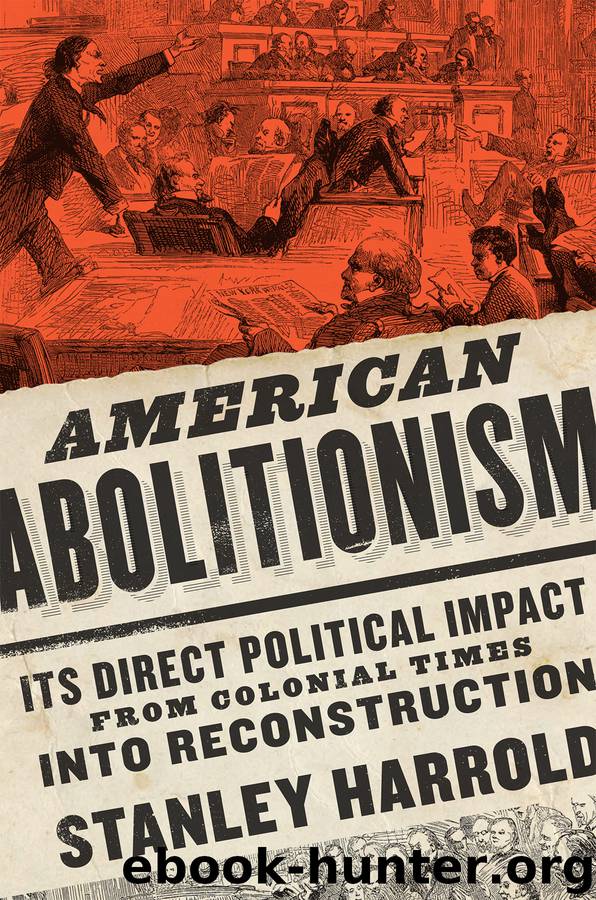American Abolitionism: Its Direct Political Impact From Colonial Times Into Reconstruction by Stanley Harrold

Author:Stanley Harrold
Language: eng
Format: epub
Tags: HIS036050 History / United States / Civil War Period (1850-1877)
Publisher: University of Virginia Press
Published: 2019-01-15T00:43:59.763000+00:00
The circumstances in which antislavery politicians acted on behalf of the Republican Party and abolitionists sought to shape those actions changed during the succeeding months as a result of a half-dozen events. First, shortly after the Republican’s Pittsburgh convention, the American Party nominated former Whig president Millard Fillmore for president on a platform that avoided the slavery issue. Second, on May 21, proslavery forces attacked the Free Stater center of Lawrence, Kansas Territory. Third, a day later, South Carolina congressman Preston Brooks physically assaulted Sumner in the U.S. Senate. Fourth, during the same weeks, black and white northerners continued to resist enforcement of the Fugitive Slave Law of 1850. Fifth, in early June, the Democratic national convention nominated James Buchanan of Pennsylvania for president on a proslavery platform.
Sixth, while meeting in Philadelphia from June 17–19, the Republican national convention rejected formal alliance with northern wing of the American Party, nominated military hero John C. Frémont for president, and adopted a much stronger platform than had the Pittsburgh gathering. Although the Philadelphia platform fell far short of denationalization, it recognized the duty of Congress to prohibit slavery in all territories and demanded that Kansas be admitted as a free-labor state. It affirmed the party’s commitment to equal rights principles imbedded in the Declaration of Independence and upheld the “liberty of conscience and equality of rights among citizens.”30
The chance that all these developments could be used to further broad-based northern opposition to slavery led to a tactical division among abolitionist leaders. Despite the changing national circumstances regarding the slavery issue and Republican progress, Garrison and most of his associates did not immediately relent in their criticism of the Republican Party. In an Independence Day address, Garrison said he would not support the Republicans because they vowed “fealty to the Union, come what may.” He also noted that the Philadelphia platform did not oppose slavery in the District of Columbia, the interstate slave trade, or the Fugitive Slave Law. He objected to racist boasts that “Republicanism is the white man’s party.” He stood, he said, “outside the tyrannical government, a seceder on principle, a revolutionist.” He called for disunion, for supporting “neither . . . Fremont, nor Buchanan, nor Fillmore.”31
But as the campaign progressed, Garrison returned to the tactic of balancing criticism with praise. In September he referred to the Republican Party as “the only political party that remains true to the original [constitutional] compact.” He declared that “the Democratic and American parties [were] with the Slave Power to the utmost extent of its usurpations.” Therefore, he wrote, “the sympathy of every genuine friend of freedom must be with the Republican party, in spite of its lamentable short-comings.” In October, in a letter to the Pennsylvania Anti-Slavery Society annual meeting, Garrison went so far as to characterize that party as “the legitimate product of the moral agitation of the subject of slavery for the last quarter century.” It was, he asserted, “incomparably better” than the American and Democratic Parties.32
A minority of Garrison’s associates moved more quickly than he toward openly expressing such favorable views of the Republican Party.
Download
This site does not store any files on its server. We only index and link to content provided by other sites. Please contact the content providers to delete copyright contents if any and email us, we'll remove relevant links or contents immediately.
| General | Discrimination & Racism |
Nudge - Improving Decisions about Health, Wealth, and Happiness by Thaler Sunstein(7692)
The Fire Next Time by James Baldwin(5431)
iGen by Jean M. Twenge(5408)
Adulting by Kelly Williams Brown(4565)
The Sports Rules Book by Human Kinetics(4379)
The Hacking of the American Mind by Robert H. Lustig(4375)
The Ethical Slut by Janet W. Hardy(4242)
Captivate by Vanessa Van Edwards(3838)
Mummy Knew by Lisa James(3686)
In a Sunburned Country by Bill Bryson(3537)
The Worm at the Core by Sheldon Solomon(3486)
Ants Among Elephants by Sujatha Gidla(3460)
The 48 laws of power by Robert Greene & Joost Elffers(3246)
Suicide: A Study in Sociology by Emile Durkheim(3018)
The Slow Fix: Solve Problems, Work Smarter, and Live Better In a World Addicted to Speed by Carl Honore(3007)
The Tipping Point by Malcolm Gladwell(2914)
Humans of New York by Brandon Stanton(2868)
Handbook of Forensic Sociology and Psychology by Stephen J. Morewitz & Mark L. Goldstein(2694)
The Happy Hooker by Xaviera Hollander(2686)
